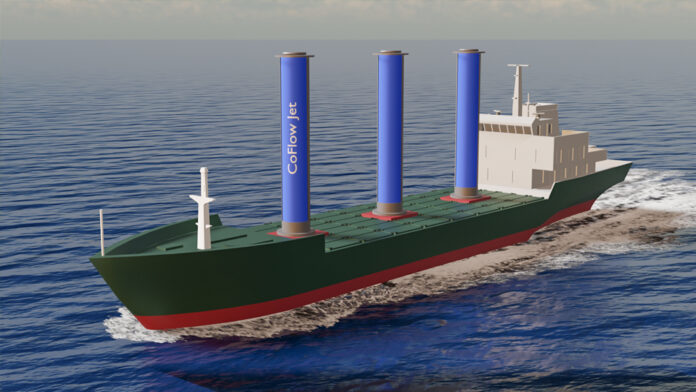A University of Miami researcher is developing wind-powered cylinders aiming to propel existing cargo ships, lessening the shipping industry’s dependence on fossil fuels and cutting greenhouse gas emissions.
“What’s old is new again,” claims GeCheng Zha, a professor of aerospace engineering and director of the Aerodynamics and Computational Fluid Dynamics Lab at the University of Miami College of Engineering, who wants to help the shipping industry trying to employ an age-old method of propulsion: wind.
“With the technological advancements of today, wind-assisted propulsion is an efficient alternative to diesel engines. And the major advantage is that it’s environmentally friendly – an effective way to decarbonize the shipping industry which is responsible for about 3% of global greenhouse gas emissions,” he said.
Zha is developing giant cylinders that would be mounted on the decks of cargo ships, generating thrust by sucking in, pressurizing, and ejecting air in a different direction. Several stories high, each cylinder could be lowered, allowing ships to pass beneath bridges and to navigate in and out of ports.
On some shipping routes, the cylinders could cut fuel consumption by as much as 50%, according to the researcher, who is still in the design and simulation phase for his wind-propulsion instruments.
“The shipping industry has had a tendency to resist change because diesel engines are so powerful,” Zha said. “But now, with pressure mounting, either willingly or unwillingly, it will have to change.”
His high-tech cylinders represent a growing movement in the shipping industry to develop and employ wind-assisted technologies to make cargo ships greener. From spinning rotors that use the so-called Magnus force to convert wind energy into propulsive force to nonrotating suction wings that use vents and internal fans to achieve propulsion, the technology to power cargo ships with an age-old concept is gaining steam.
The technology is already in use on some vessels. About 30 cargo ships out of a global fleet of roughly 60,000 are currently using wind propulsion, deploying rigid sails made of aluminum, fiberglass, and carbon fiber that operate under minimum power from a ship’s engines. That number is expected to increase to nearly 11,000 by the end of this decade, according to the London-based International Windship Association.
Zha’s nonrotating cylinders, developed with co-flow jet technology similar to what he employed for his ongoing research on new types of aircraft, would be “much more efficient” than wind-assisted propulsion units that are currently in use on the few cargo ships that have them, according to the researcher.
“We would be capable of achieving greater thrust,” said GeCheng Zha, who now seeks funding to develop a prototype. “We’ll get there. With about 90% of the world’s trade traveling by ship, this technology is a ‘windfall’ of an idea.”







